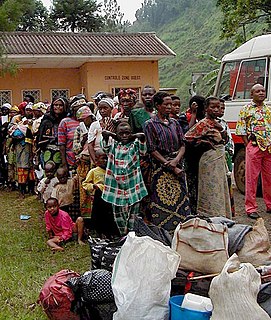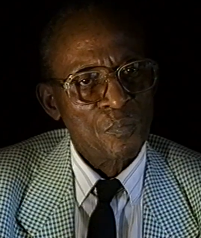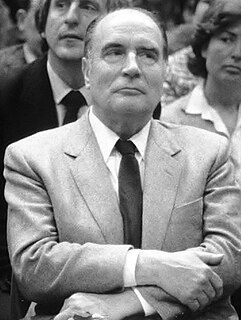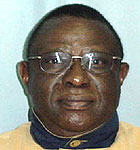
Léon Kengo wa Dondo is a Congolese politician who served as the "first state commissioner" several times under Mobutu Sese Seko in Zaïre. He was one of the most powerful figures in the regime and was a strong advocate of economic globalization and free-market economics. Since 2007, he has been President of the Senate of the Democratic Republic of the Congo.

The Rwandan genocide, also known as the genocide against the Tutsi, was a mass slaughter of Tutsi in Rwanda during the Rwandan Civil War, which had started in 1990. It was directed by members of the Hutu majority government during the 100-day period from 7 April to mid-July 1994. An estimated 500,000 to 1,000,000 Rwandans were killed, constituting an estimated 70% of the Tutsi population. Additionally, 30% of the Pygmy Batwa were killed. The genocide and widespread slaughter of Rwandans ended after the Tutsi-backed and heavily armed Rwandan Patriotic Front (RPF), led by Paul Kagame, took control of the capital and the country. An estimated 2,000,000 Rwandans, mostly Hutu, were displaced and became refugees.

Agathe Uwilingiyimana, sometimes known as Madame Agathe, was a Rwandan political figure. She served as Prime Minister of Rwanda from 18 July 1993 until her assassination on 7 April 1994, during the opening stages of the Rwandan genocide. She was Rwanda's first and so far only female prime minister.

The Second Congo War began in the Democratic Republic of the Congo in August 1998, little more than a year after the First Congo War, and involved some of the same issues. The war officially ended in July 2003, when the Transitional Government of the Democratic Republic of the Congo took power. Although a peace agreement was signed in 2002, violence has continued in many regions of the country, especially in the east. Hostilities have continued since the ongoing Lord's Resistance Army insurgency, and the Kivu and Ituri conflicts.

This article details the role of the international community in the Rwandan genocide.

Pauline Nyiramasuhuko is a Rwandan politician who was the Minister for Family Welfare and the Advancement of Women. She was convicted of having incited troops and militia to carry out rape during the Rwandan genocide of 1994. She was tried for genocide and incitement to rape as part of the "Butare Group" at the International Criminal Tribunal for Rwanda (ICTR) in Arusha, Tanzania. In June 2011, she was convicted of seven charges and sentenced to life imprisonment. Nyiramasuhuko is the first woman to be convicted of genocide by the ICTR, and the first woman to be convicted of genocidal rape.
The Rwanda Defence Force is the national army of Rwanda. The country's armed forces were originally known as the Rwandan Armed Forces (FAR), but following the victory of the Rwandan Patriotic Front in the country's civil war in 1994, it was renamed to the Rwandan Patriotic Army (RPA), and later to its current name.

Théodore Sindikubwabo (1928–1998) was the interim President of Rwanda during the Rwandan genocide, from April 9 to July 19, 1994. Prior to that he was President of the National Development Council 1988–1994.
Jean Kambanda was the Prime Minister in the caretaker government of Rwanda from the start of the 1994 Rwandan genocide. He is the only head of government to plead guilty to genocide, in the first group of such convictions since the Convention on the Prevention and Punishment of the Crime of Genocide came into effect in 1951.

On the evening of 6 April 1994, the airplane carrying Rwandan president Juvénal Habyarimana and Burundian president Cyprien Ntaryamira, both Hutu, was shot down with surface-to-air missiles as it prepared to land in Kigali, Rwanda. The assassination set in motion two of the bloodiest events of the late 20th century: the Rwandan genocide and the First Congo War.

Human rights in Rwanda have been violated on a grand scale. The greatest violation is the Rwandan genocide of Tutsi in 1994. The post-genocide government is also responsible for grave violations of human rights.
Drew White is an international lawyer from Canada best known for his role in the conviction of Colonel Theoneste Bagosora, who the media dubbed "the mastermind" of the 1994 Rwanda genocide and who White referred to in his closing trial submissions as one of the "enemies of the human race".
The following lists events that happened during 2007 in Rwanda.
The following lists events that happened during 2009 in Rwanda.
The following lists events that happened during 2012 in the Republic of Rwanda.















